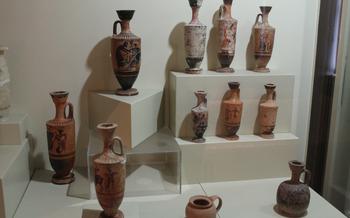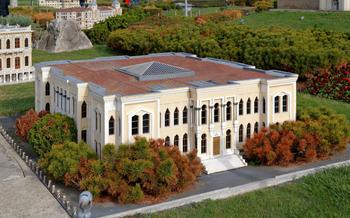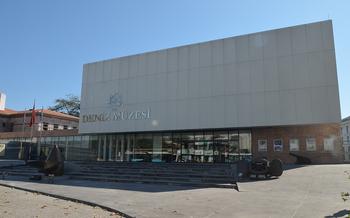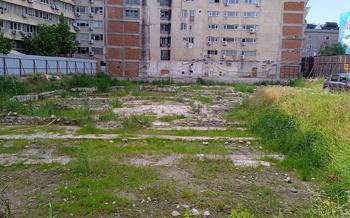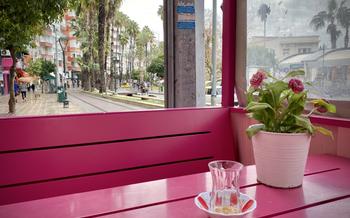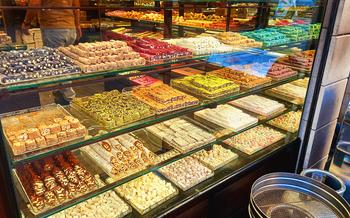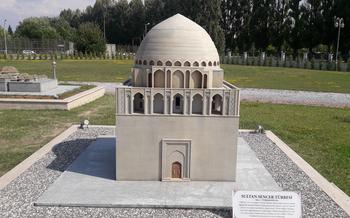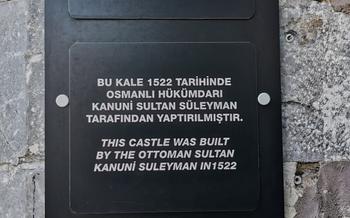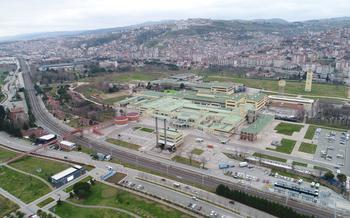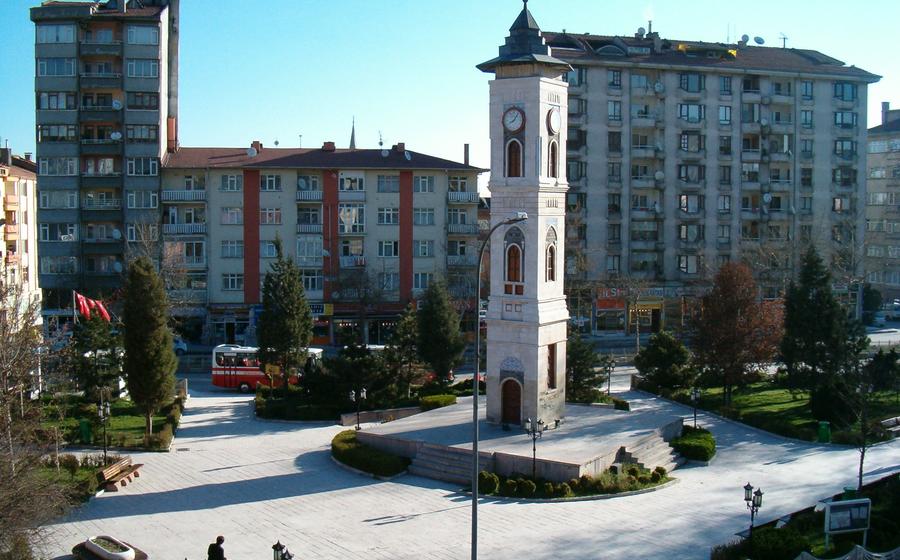
Kütahya Dönenler Ceramics Museum
- Kütahya: A City of Ceramics
- Location and Accessibility
- Hours of Operation and Admission Fees
- Collection Highlights
- Interactive Exhibits
- Guided Tours
- Workshops and Classes
- Photography and Videography
- Gift Shop and Souvenirs
- Accessibility for Visitors with Disabilities
- Museum Events and Programs
- Historical Context
- Comparison with Other Museums
- Insider Tip:
Kütahya: A City of Ceramics
Kütahya, a city nestled in the western Anatolian region of Turkey, holds a rich legacy of ceramic artistry that spans centuries. The city's connection with ceramics dates back to the 13th century when skilled potters settled in the area, drawn by the abundance of high-quality clay and the patronage of the Seljuk dynasty. Over time, Kütahya emerged as a prominent center for ceramic production, renowned for its exquisite craftsmanship, vibrant colors, and intricate designs.
The art of ceramics became deeply intertwined with the cultural identity and economic fabric of Kütahya. Local artisans honed their skills, developing unique techniques and styles that set their work apart. The city's ceramics gained widespread recognition and were eagerly sought after by collectors and merchants from across the region. The thriving ceramic industry not only provided a livelihood for many families but also contributed significantly to the city's overall prosperity.
Home to an impressive collection of ceramic masterpieces, the Kütahya Dönenler Ceramics Museum stands as a testament to the city's rich ceramic heritage. Within its walls, visitors can embark on a journey through time, exploring the evolution of ceramic art in Kütahya and marveling at the stunning creations that have emerged from this creative hub.
Location and Accessibility
The Kütahya Dönenler Ceramics Museum is conveniently located in the heart of Kütahya, making it easily accessible for visitors. It is situated on the Göztepe Mahallesi, Dönenler Caddesi, No:2, just a short walk from the city center. To reach the museum, visitors can take advantage of the city's public transportation system. Several bus lines, including the No. 1, 2, and 3 buses, stop within a short walking distance of the museum. For those traveling by car, there are limited parking options available in the vicinity of the museum. Visitors can park their vehicles on the side streets or in the designated parking areas near the museum.
Hours of Operation and Admission Fees
The Kütahya Dönenler Ceramics Museum is open to the public six days a week, from Tuesday to Sunday. The museum's doors are open from 8:30 am to 5:30 pm, giving visitors ample time to explore the extensive collection of ceramic artworks.
Admission fees are quite affordable, ensuring that everyone can enjoy the museum's treasures. Regular admission for adults is set at 10 Turkish Lira, while children and students can enter for a discounted rate of 5 Turkish Lira. The museum also offers special discounts for groups and families, making it an excellent destination for a cultural outing with loved ones.
Keep an eye out for special promotions and events throughout the year, as the museum often hosts free admission days or discounted rates for certain groups or occasions. These promotions are announced on the museum's website and social media channels, so be sure to check before your visit.
Collection Highlights
Among the museum's most notable exhibits are the Kütahya tiles, renowned for their intricate designs and vibrant colors. These tiles, crafted in the 17th and 18th centuries, showcase a fusion of Ottoman and Seljuk motifs, depicting scenes from nature, mythology, and everyday life. Each tile is a unique masterpiece, narrating stories through its intricate patterns and vibrant hues.
Another highlight is the Kütahya pottery, known for its distinctive shapes and decorative elements. The museum houses an extensive collection of pottery, from humble kitchenware to elaborate decorative pieces. These artifacts provide a glimpse into the daily lives and artistic traditions of Kütahya's past.
One of the museum's most captivating exhibits is the Kütahya figurines, which depict a wide range of human and animal forms. These figurines, crafted with remarkable detail and realism, offer a glimpse into the artistic and cultural influences that have shaped Kütahya's ceramic heritage.
Each highlight in the Kütahya Dönenler Ceramics Museum holds a unique story, reflecting the city's rich history, cultural diversity, and artistic prowess. Whether it's the intricate patterns of the tiles, the rustic charm of the pottery, or the lifelike beauty of the figurines, the museum's collection offers a captivating journey through the world of Kütahya's ceramics.
Interactive Exhibits
The Kütahya Dönenler Ceramics Museum offers a variety of interactive exhibits that engage visitors with the ceramic art and history. These exhibits are designed to provide a hands-on and immersive experience for visitors of all ages.
One popular interactive exhibit is the pottery wheel. Visitors can try their hand at throwing clay on a potter's wheel, guided by an experienced potter. This activity is a great way to learn about the basic techniques of pottery and to create your own unique ceramic piece.
Another interactive exhibit is the glaze station. Visitors can choose from a variety of glazes and apply them to their own ceramic pieces. The museum staff will then fire the pieces in a kiln, and visitors can return to collect their glazed ceramics a few days later.
The museum also offers a variety of educational exhibits that teach visitors about the history and culture of ceramics in Kütahya. These exhibits include displays of traditional ceramic tools and techniques, as well as information about the different types of ceramics that are produced in the region.
The interactive exhibits at the Kütahya Dönenler Ceramics Museum are a great way to learn about the ceramic art and history in a fun and engaging way. These exhibits are suitable for visitors of all ages, and they are sure to leave a lasting impression.
Guided Tours
Guided tours of the Kütahya Dönenler Ceramics Museum are available for groups and individuals who want a more in-depth and personalized experience. These tours are led by knowledgeable museum staff who provide insights into the history of ceramics in Kütahya, the unique characteristics of the museum's collection, and the stories behind the creation or acquisition of specific artifacts.
Guided tours can be arranged in advance by contacting the museum directly. Tours are typically offered in Turkish, but English-speaking guides are also available upon request. The cost of a guided tour varies depending on the size of the group and the duration of the tour.
Whether you're a history buff, an art enthusiast, or simply curious about the world of ceramics, a guided tour of the Kütahya Dönenler Ceramics Museum is a great way to make the most of your visit. With their expert knowledge and passion for the subject, the museum's guides will bring the collection to life and give you a deeper understanding of the significance of ceramics in Kütahya's culture and history.
Workshops and Classes
The Kütahya Dönenler Ceramics Museum offers a range of pottery workshops and classes for individuals of all skill levels, providing an opportunity to learn from experienced ceramicists and immerse oneself in the art of ceramics.
These workshops are held regularly, with varying frequencies and durations depending on the specific workshop. Some workshops are one-time events, while others may run for several weeks or months.
Fees for the workshops are typically charged per session or per course, and participants are required to register in advance to secure a spot. The museum's website provides detailed information on the available workshops, including schedules, fees, and registration procedures.
The workshops cover a variety of topics and techniques, from basic hand-building and glazing to more advanced wheel-throwing and decorative methods. Participants have the opportunity to work with different types of clay, learn about firing techniques, and create their own unique ceramic pieces.
These workshops are suitable for both beginners who want to explore the basics of ceramics and experienced potters looking to refine their skills or learn new techniques. The museum's experienced instructors provide guidance and support throughout the workshops, ensuring that participants have a productive and enjoyable learning experience.
Photography and Videography
The Kütahya Dönenler Ceramics Museum encourages visitors to capture the beauty of its collection through photography and videography. However, to ensure the preservation of the artifacts and the comfort of other visitors, certain guidelines must be followed.
Flash photography is strictly prohibited within the museum as it can damage the delicate glazes and colors of the ceramics. The use of tripods is also discouraged to avoid obstructing the pathways and causing inconvenience to other visitors.
While personal photography and videography for non-commercial purposes are permitted, any images or footage captured within the museum must not be used for commercial purposes or reproduced without prior written permission from the museum administration. This policy aims to protect the intellectual property rights of the museum and the artists whose works are displayed.
By adhering to these guidelines, visitors can help preserve the integrity of the museum's collection while sharing their experiences with others through their creative expressions.
Gift Shop and Souvenirs
The gift shop at the Kütahya Dönenler Ceramics Museum offers a treasure trove of ceramic souvenirs and local handicrafts that are perfect for commemorating your visit. From intricate hand-painted plates and bowls to delicate figurines and decorative tiles, you'll find a wide variety of items to choose from. Prices range from affordable trinkets to more exclusive pieces, ensuring that there's something for every budget.
One of the unique aspects of the gift shop is its support for local artisans. Many of the items sold are handcrafted by talented ceramicists in the Kütahya region, providing a platform for them to showcase and sell their work. By purchasing souvenirs from the gift shop, you not only take home a piece of Kütahya's ceramic heritage but also contribute to the livelihoods of local artists.
In addition to ceramics, the gift shop also offers a selection of traditional Turkish handicrafts, such as handwoven rugs, embroidered textiles, and copperware. These items make for excellent gifts for friends and family back home, as they represent the rich cultural heritage of Turkey.
So, whether you're looking for a unique souvenir, a thoughtful gift, or a way to support local artisans, be sure to visit the gift shop at the Kütahya Dönenler Ceramics Museum.
Accessibility for Visitors with Disabilities
The Kütahya Dönenler Ceramics Museum is committed to providing an inclusive and accessible experience for all visitors, including those with disabilities. The museum is equipped with a wheelchair-accessible entrance, ramps, and elevators, ensuring that visitors with mobility impairments can easily navigate the different floors and exhibits. Additionally, the museum offers special assistance to visitors with disabilities, such as providing wheelchairs or guided tours tailored to their specific needs. Staff members are trained to be attentive and accommodating, ensuring that all visitors have a comfortable and enjoyable experience at the museum.
Museum Events and Programs
The Kütahya Dönenler Ceramics Museum hosts a variety of events and programs throughout the year, ensuring that there's always something new to explore. Temporary exhibitions showcase the works of contemporary ceramic artists, providing a platform for emerging talents and innovative expressions in the field. Interactive workshops and demonstrations offer hands-on experiences for visitors of all ages, allowing them to learn about different ceramic techniques and create their own unique pieces. Lectures, seminars, and educational programs delve into the history, cultural significance, and scientific aspects of ceramics, providing a deeper understanding and appreciation for this ancient art form. To stay updated about upcoming events and programs, visitors can check the museum's website or social media pages, ensuring they don't miss out on any special offerings.
Historical Context
The history of ceramic production in Kütahya dates back to the Byzantine period, with evidence of early kilns and pottery fragments found in the region. During the Seljuk era, Kütahya became a prominent center for ceramic production, renowned for its unique glazes and decorative techniques. The city's ceramic tradition continued to flourish under the Ottoman Empire, reaching its peak in the 16th and 17th centuries. During this time, Kütahya's ceramics were highly prized and exported throughout the empire and beyond, gaining international recognition for their exquisite craftsmanship. The city's potters developed a distinctive style characterized by vibrant colors, intricate patterns, and a variety of forms, including plates, bowls, tiles, and decorative objects. The Kütahya Dönenler Ceramics Museum showcases this rich ceramic heritage, preserving and celebrating the city's long-standing tradition of ceramic artistry.
Comparison with Other Museums
The Kütahya Dönenler Ceramics Museum stands out among other ceramic museums in Turkey and beyond due to its unique features. Unlike many museums that focus primarily on displaying historical artifacts, the Kütahya Dönenler Ceramics Museum also serves as a vibrant center for ceramic art and education. Visitors can not only admire the diverse collection of ceramic pieces but also participate in interactive workshops and classes, allowing them to gain hands-on experience in creating their own ceramic masterpieces.
Another distinguishing feature of the Kütahya Dönenler Ceramics Museum is its emphasis on contemporary ceramics. While many museums focus primarily on traditional or historical ceramics, the Kütahya Dönenler Ceramics Museum showcases a significant collection of modern and contemporary ceramic art. This provides visitors with an opportunity to explore the latest trends and innovations in the field of ceramics, and to appreciate the diverse range of styles and techniques employed by contemporary ceramic artists.
Additionally, the Kütahya Dönenler Ceramics Museum is unique in its dedication to preserving and promoting the ceramic heritage of Kütahya. The museum houses a significant collection of Kütahya ceramics, including many rare and valuable pieces, which provides visitors with an in-depth understanding of the city's rich ceramic tradition. The museum also actively supports local ceramic artisans by providing them with a platform to showcase and sell their work, contributing to the sustainability of the local ceramic industry.
Insider Tip:
For a unique perspective, visit the museum's rooftop terrace, which offers panoramic city views and a glimpse into the surrounding countryside.
Plan your visit during the annual Kütahya Ceramics Festival, held in July, to witness live pottery demonstrations, exhibitions, and a vibrant marketplace.
Combine your museum visit with a pottery workshop to create your own ceramic masterpiece under the guidance of experienced artisans.
Explore the charming alleys of the nearby Çiniciler Çarşısı (Pottery Bazaar) to discover a variety of ceramic shops, workshops, and galleries.
For a tranquil experience, visit the museum early in the morning or during the off-season to avoid crowds and fully appreciate the intricate details of the ceramic collection.
